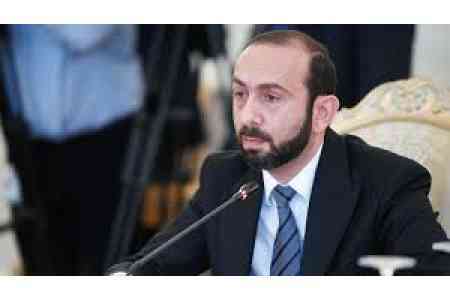


ArmInfo. The Black Sea region has always been a crossroads of civilizations, trade, and geopolitical interests, serving as an important link between Europe, the South Caucasus, and Central Asia.
Armenian Foreign Minister Ararat Mirzoyan made this statement during his speech at the Ministerial Meeting "Cross-Regional Security and Connectivity," organized by the European Union. Discussions focused on issues of security, stability, and resilience in the Black Sea region.
He expressed confidence that the enhanced interaction between Europe, Central Asia, and the South Caucasus can foster connectivity and sustainable development, and mutually beneficial partnerships, significantly changing the region's geopolitical and economic landscape. Mirzoyan added that these are not just words or an ambitious vision, but a pressing imperative.
"In this context, we, of course, recognize that the realization of this vision requires peace and stability. While the broader Black Sea faces profound challenges, primarily due to the war in Ukraine, with its immense human suffering, the South Caucasus has recently embarked on a journey toward lasting peace. On August 8, 2025, a historic step was taken in Washington, DC, where the leaders of Armenia, Azerbaijan and the US signed the already well-known Joint Peace Declaration, and the Agreement on the Establishment of Peace and Inter-State Relations between Armenia and Azerbaijan was initialled by the Azerbaijani foreign minister and myself. Hence, peace has been established, and the three leaders have expressed a strong commitment to enhance it," the Armenian Foreign Minister added.
He expressed confidence that this lays a solid foundation for closing the chapter of hostility, for opening a new era of good-neighborly relations based on mutual respect, sovereignty, territorial integrity, and inviolability of borders, consistent with the UN Charter and the 1991 Alma-Ata Declaration. Mirzoyan emphasized that the path forward is a process requiring patience, care, addressing practical issues, and building mutual trust.
"Armenia engages in good faith towards transforming the space of confrontation into one of constructive engagement and cooperation," the Armenian diplomat continued. He acknowledged that being at the crossroads, Armenia can play a crucial role in the chain connecting Europe, the South Caucasus, and Central Asia.
"The unblocking of transport communications between Armenia and Azerbaijan, as agreed upon on August 8, will foster mutually beneficial transport links - including Armenia's "Crossroads of Peace" project and its integral part - the TRIPP route (Trump Route for International Peace and Prosperity) in Armenia, all operating under the full sovereignty, territorial integrity and jurisdiction of states. By strengthening this chain, we can advance mutual trust, interdependence and sustainable growth. As European Commission president Ursula von der Leyen coined it at the EU-Central Asia summit, "opening the borders of Armenia with Azerbaijan and Turkiye will be a game-changer." This is also why we welcome the establishment of the EU Coordination Platform on the Trans-Caspian Transport Corridor, and Armenia stands ready to be an active and constructive partner in its success, including via involvement of our "Crossroads of Peace" project and TRIPP route in the EU's Global Gateway," he believes.
According to him, this new era of security and stability in the South Caucasus is underpinned by Armenia's commitment to further enhancing the country's resilience, and its partnership with the European Union plays is central in these efforts. " We have added a robust security dimension to the Armenia-EU bilateral agenda, moving our relationship beyond political and economic cooperation into the realm of strategic partnership," he continued. Additionally, Mirzoyan said, like many democratic countries, Armenia is confronting a surge in hybrid threats, particularly Foreign Information Manipulation and Interference. " These are not random acts of disruption. These are targeted, systematic, hostile campaigns designed to achieve specific goals, including undermining our sovereignty and trust in democratic institutions, and sabotaging the aspirations for cooperation and like-minded partnerships. Countering this requires robust, trust-based cooperation among states that share a commitment to fundamental principles and norms of international law and democratic way of life. In this endeavor, you can rely on Armenia as a trustworthy partner," the Armenian Foreign Minister concluded.